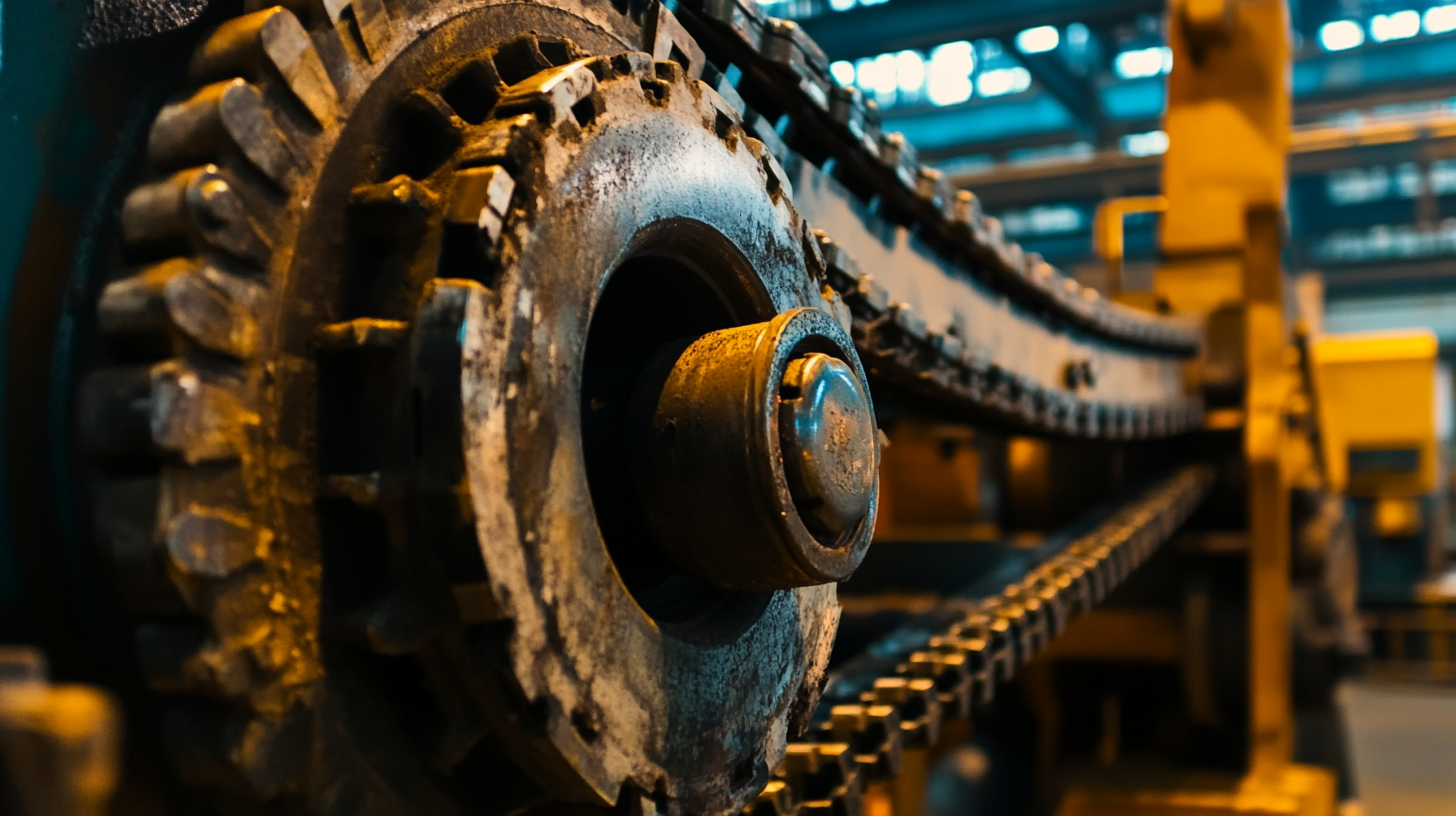In the competitive world of mining, the efficiency and longevity of your operations heavily depend on the quality of the equipment used, particularly the Mining Machinery Spare Parts. Selecting the right spare parts is crucial not only for maintaining the operational effectiveness of machinery but also for ensuring safety and minimizing downtime. With numerous manufacturers offering a wide range of products, identifying and selecting the best quality suppliers can be a daunting task for anyone in the industry.

This blog aims to guide you through a systematic approach to evaluate and choose the right manufacturers globally, ensuring that your machinery remains in optimal condition while fostering long-term reliability and performance in your mining operations. By understanding key criteria and leveraging best practices, you can make informed decisions and ultimately contribute to the overall success of your project.
When it comes to mining operations, understanding the various types of machinery spare parts available globally is crucial for maintaining efficiency and productivity. Mining machinery encompasses a wide range of equipment, each requiring specific components to function optimally. Common types of spare parts include wear parts like buckets, blades, and plates, which are subject to significant wear and tear due to harsh mining environments. Additionally, hydraulic components, such as pumps and cylinders, play a critical role in the operational effectiveness of heavy machinery, ensuring that processes such as digging and transporting materials run smoothly.
Moreover, electronic components have become increasingly vital as mining machinery integrates advanced technology for improved performance. Parts like sensors, control systems, and monitors not only enhance operational capabilities but also provide necessary data analytics for better decision-making. Understanding the nuances of these spare parts enables mining companies to make informed purchasing decisions, ultimately leading to increased uptime and reduced maintenance costs. By familiarizing themselves with the different types of spare parts, companies can engage with the best manufacturers around the globe, ensuring that they acquire high-quality components that meet their specific operational needs.
When it comes to selecting the best quality mining machinery spare parts manufacturers, there are several key factors to consider. One of the most important aspects is the manufacturer's experience and reputation in the industry. According to a report from ResearchAndMarkets, the global mining equipment market is expected to reach a value of $101.22 billion by 2026, making competition among manufacturers fierce. Opting for a manufacturer with a solid track record and positive customer reviews can help ensure the reliability and durability of the spare parts you acquire.
Another critical factor to evaluate is the manufacturer's commitment to quality assurance processes. Industry standards such as ISO 9001 certification are pivotal, as they indicate adherence to international quality management principles. A survey conducted by a leading mining association revealed that equipment failures caused by subpar spare parts can lead to operational downtimes averaging 20%, drastically impacting productivity and costs. Therefore, choosing manufacturers that prioritize rigorous testing and quality checks can significantly mitigate risks associated with machinery breakdowns.
| Criterion | Description | Importance Rating (1-5) |
|---|---|---|
| Quality Standards | Certifications such as ISO, ASTM, or other industry-specific standards. | 5 |
| Manufacturing Process | Advanced technologies and quality control during production. | 4 |
| Material Sourcing | Use of high-grade materials and suppliers with good reputations. | 5 |
| Customer Feedback | Reviews and testimonials from previous clients regarding durability and service. | 4 |
| After-Sales Support | Availability of technical support and parts replacement guarantees. | 5 |
| Delivery Timelines | Efficiency and reliability of the supply chain for timely deliveries. | 4 |
| Pricing Structure | Competitiveness of prices without compromising quality. | 3 |
| Research and Development | Investment in R&D for innovative solutions and improved products. | 4 |
 When selecting quality mining machinery spare parts manufacturers, it is essential to look for industry standards and certifications that indicate reliability and performance. Globally recognized certifications, such as ISO 9001 for quality management systems and ISO 14001 for environmental management, illustrate a manufacturer’s commitment to maintaining high operational standards. According to a report by MarketsandMarkets, the global mining equipment market is expected to reach $250 billion by 2025, underscoring the significance of sourcing components from reputable manufacturers who adhere to these standards.
When selecting quality mining machinery spare parts manufacturers, it is essential to look for industry standards and certifications that indicate reliability and performance. Globally recognized certifications, such as ISO 9001 for quality management systems and ISO 14001 for environmental management, illustrate a manufacturer’s commitment to maintaining high operational standards. According to a report by MarketsandMarkets, the global mining equipment market is expected to reach $250 billion by 2025, underscoring the significance of sourcing components from reputable manufacturers who adhere to these standards.
Tip: Always verify a manufacturer’s certifications and their adherence to international quality standards before making a procurement decision. This diligence can mitigate risks associated with subpar parts that could lead to operational failures.
Additionally, certifications like CE marking and API certifications play a crucial role in marking quality assurance. For instance, a manufacturer with API standards demonstrates their capability in producing parts that meet specific petroleum and natural gas industry requirements. This can be a vital indicator of durability and reliability, essential for the harsh conditions prevalent in mining operations.
Tip: Engage with past clients and review case studies related to the manufacturers’ products to gain insights into their reliability and quality assurance over time.
When researching and comparing global mining machinery spare parts suppliers, start by identifying your specific needs. Understanding the exact specifications of the parts you require will help narrow down your options. Look for suppliers who specialize in the type of machinery you operate; this focus often translates to deeper expertise and higher-quality products.
Tips: Utilize online directories and industry-specific platforms to find reputable suppliers. Read reviews and testimonials from other mining companies to gauge the reliability and service quality of potential partners. Additionally, check if they have certifications for quality management systems, as this can be an indicator of their commitment to high standards.
Next, request quotes and compare prices to assess the value offered by different suppliers. Keep an eye out for hidden costs, such as shipping or customs fees, which can impact your total expenditure. It is also beneficial to inquire about warranty policies and customer support services, as these factors often play a significant role in your long-term satisfaction with the supplier.
Tips: Engage directly with suppliers to discuss their offerings and address any questions or concerns you may have. This interaction can provide insight into their customer service approach and responsiveness. Don't hesitate to ask for samples to evaluate the quality of their spare parts before making a full commitment.
Establishing long-term relationships with quality spare parts manufacturers is pivotal in the mining machinery industry. A recent report by Grand View Research indicates that the global mining equipment market is expected to reach
$368.99 billion by 2025, underlining the critical role that reliable spare parts play in maintaining operational efficiency. By building trust and transparent communication with manufacturers, mining companies can ensure they receive high-quality components that increase the longevity of their machinery and reduce downtime, which is a crucial factor in driving profitability.
Fostering a collaborative relationship involves regular interaction and feedback loops. Engaging in joint ventures or partnerships can also be beneficial, as highlighted in a report by the Equipment Manufacturers Association which suggests that companies that maintain strong ties with their suppliers see a
20% reduction in production costs. Additionally, embracing technology such as digital platforms for real-time ordering and inventory management can enhance these relationships, allowing for quicker response times and ensuring that the necessary parts are always available when needed. Adopting these strategies will position companies at the forefront of efficiency and reliability in the mining sector.




